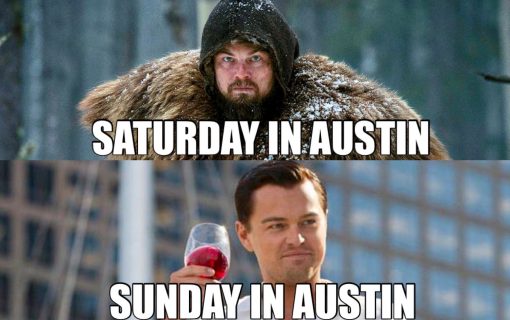It’s an older building, complete with exposed brick and lined with carpet. The hallways are lined with community boards, member photos, and posters.
Upon entering, you’re immediately greeted with a friendly smile from one of the organization’s members. I didn’t sign in, but typical protocol requires members to do so.
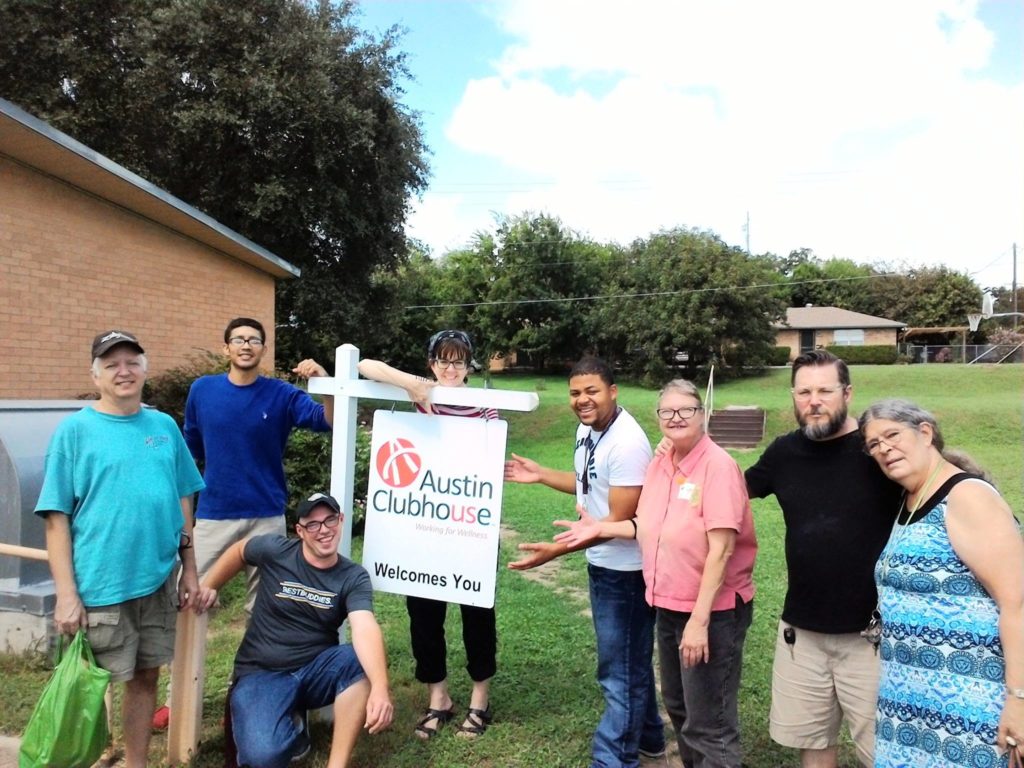
Staff and members stand together outside the clubhouse. Photo courtesy of Facebook.
To your left is the kitchen. Past that is a large room split into two: the dining area and the communal recreational space. It’s where morning and afternoon meetings are held, and where members congregate for daily fitness activities, like yoga. There’s a small courtyard nearby.
This is Austin Clubhouse. Located inside Hyde Park Christian Church, the local non-profit works to empower and support adults living with a mental illness. It’s a community.
A Working Lunch
The original clubhouse began in 1948 in New York City from a group of individuals at Rockland State Hospital. While the six patients came together during their time at the hospital, it was only after they left Rockland that their meetings became part of their individual and group successes.

Clubhouse members working the front desk greet visitors and fellow members alike.
The six founding members created what is today known as Fountain House. They met for a daily lunch on the steps of the city’s Public Library. Through their meetings, they offered support to the other and understood that belonging to an accepting community was vital for their personal improvement—and the betterment of those around them.
The group’s initial concept of working together and supporting each other in a collaborative space was, and still is, a key component in the clubhouse’s current mission and structure. According to the clubhouse, the Substance Abuse and Mental Health Services Administration (SAMHSA) has determined the clubhouse model an evidence based best practice for mental health treatment. These concepts are standard for every accredited clubhouse.
Today, there are more than 300 clubhouses worldwide, each a member of Clubhouse International. The only requirement for its members is that they are older than 18, have a mental health diagnosis, and are a part of a treatment program.
Normalizing Routines
According to John-Michael Krakoski, a staff member at the clubhouse, “offering a sense of community is the basis of the clubhouse.” He says an accepting and welcoming environment is an essential component for the treatment and development of individuals coping with a mental illness.
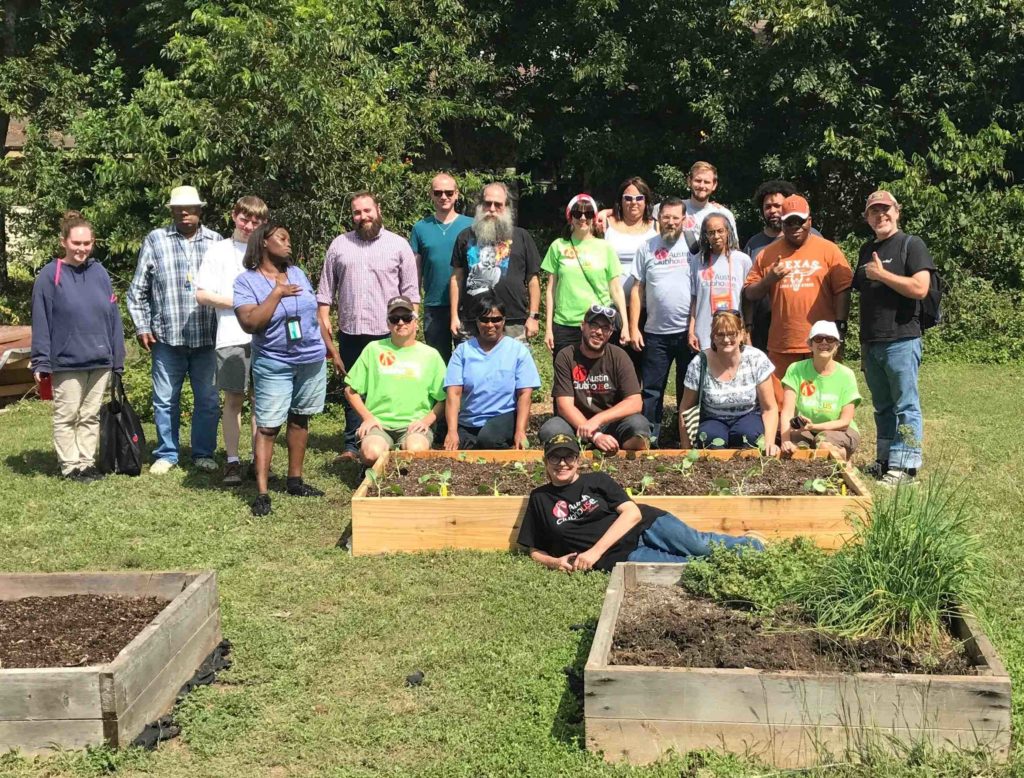
Clubhouse members are able to plant, grow, and harvest vegetables in the center’s community garden.
Choice plays a key role at Austin Clubhouse, as well. Membership is voluntary and the degree to which a member participates is entirely up to them. Krakoski says that the program’s voluntary nature reflects the clubhouse’s ideals, but is also the main reason for fluctuation in attendance numbers.
On an average day, the Austin Clubhouse will have around 40 members walk through its doors, the purpose of their visit differing every day. While a member might work in the kitchen prepping a healthy lunch one day, he or she might attend poetry class the next.
Regardless of what task or work opportunity the member is tackling, the clubhouse emphasizes meaningful work that’s essential to the organization; it normalizes daily routines.

Cathey Capers teaches “Poetry As A Tool For Recovery” in the communal recreational area at Austin Clubhouse.
Krakoski says it’s these daily, necessary tasks, like running to the grocery store or preparing a healthy lunch together, that encourage a member’s continued improvement.
“Over time, [meaningful work] reintroduces confidence [to clubhouse members] about entering into the world, and workplace, again.”
Completing such tasks facilitate a feeling of being wanted and needed, all while helping members discover their talents and abilities.
Essential Partners
Austin Clubhouse is dedicated to fostering relationships through meaningful work both inside its own walls and throughout the Austin community. And for members looking to get back into Austin’s workforce, that standard is no different.
The Transitional Employment (TE) Program enables those opportunities.
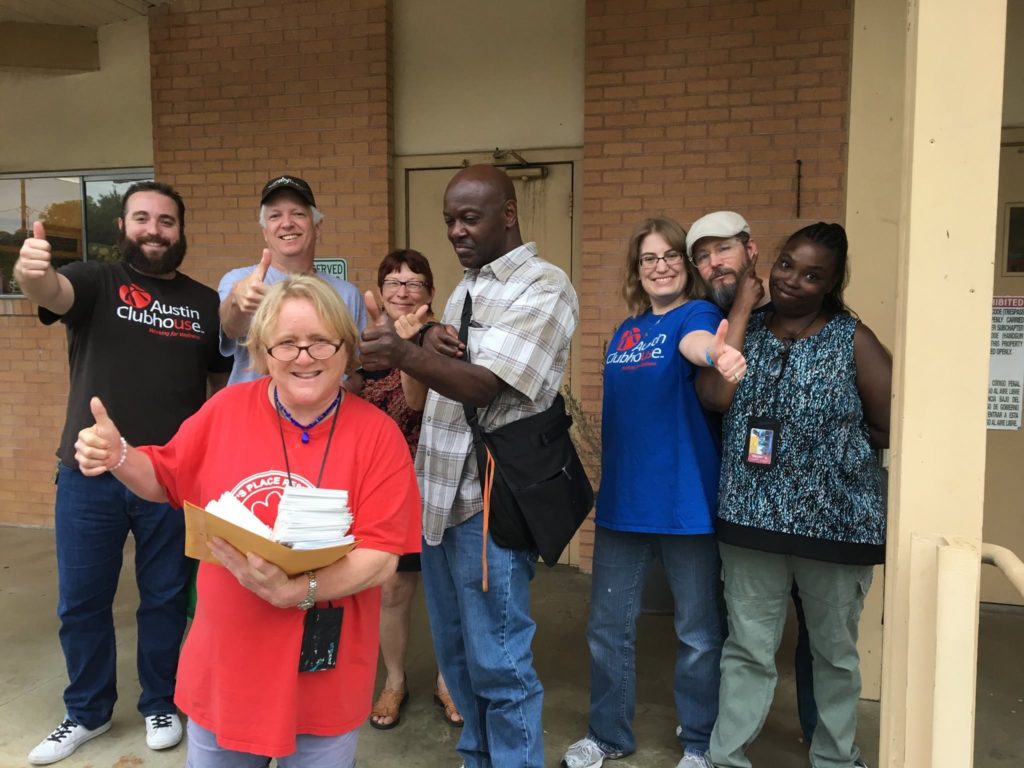
Staff and clubhouse members gather before starting the day’s tasks.
Providing part-time positions Monday through Friday, the TE program allows the clubhouse to choose suitable members for specific positions. Member employees will then receive onsite training to successfully perform the job.
The TE Program is a win-win for both employees and employers. While the employer receives guaranteed job coverage—clubhouse staff members will cover a position if a member is unable to work—employees receive ongoing support for the duration of the 6-9 month position.
Once the employee has successfully completed their role with their employer, they are able to move forward to the Supported Employment (SE) Program. The main difference is that the position belongs solely to the member, not the Clubhouse in general.

Staff and clubhouse members outside Salvation Army. Seven clubhouse members work there as part of the TE program.
Goodwill and Foundation Communities are currently the clubhouse’s main TE partners. According to the clubhouse, as many as 45% of members will reenter the paid workforce in some capacity.
One Day At A Time
Austin Clubhouse is open year around, including all holidays. By opening its doors daily, the clubhouse hopes that, one day, Central Texas will be a community in which all people living with a mental health diagnosis can achieve their highest potential.
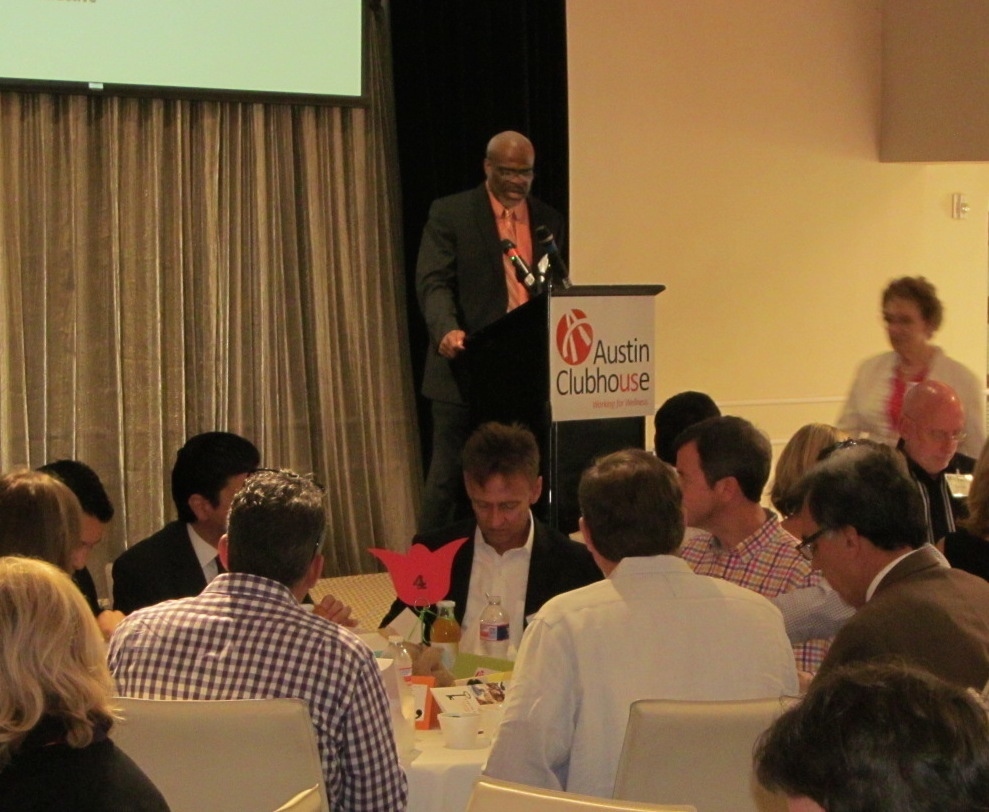
James Lee, a longtime member of Austin Clubhouse Board of Directors, gave the prayer at the clubhouse’s annual fundraiser. He passed away unexpectedly earlier this year. He will always have a special place in the hearts of clubhouse members and staff.
To further encourage this notion, the clubhouse launched the campaign One Day earlier this year. Through this program, members of the greater Austin community can either sponsor a clubhouse member’s activities for a day or sponsor a wish for the future.
Through its campaign, Austin Clubhouse hopes to not only raise awareness of its program, but also enlighten and educate. Above all, Austin Clubhouse hopes to prove that recovery from mental illness is possible.
The full video for One Day, produced by clubhouse volunteer member, Diana Colton, can be viewed here or on the clubhouse’s website.
All photos courtesy of Austin Clubhouse unless otherwise noted. Featured image courtesy of Austin Clubhouse’s Facebook page.





